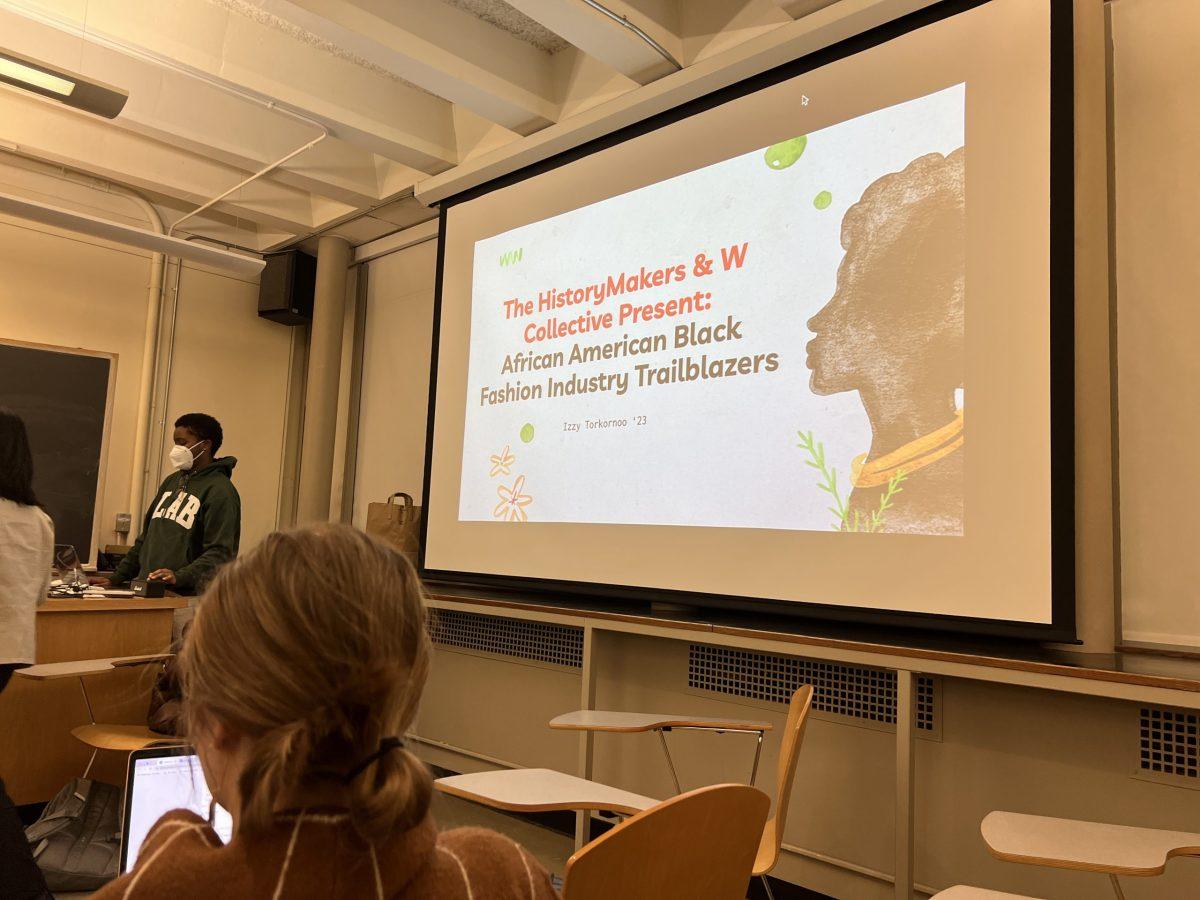The HistoryMakers Digital Archive and W.COLLECTIVE, Wellesley College’s fashion and lifestyle publication, collaborated to host an interactive lecture and discussion on African American trailblazers in the fashion industry on Feb. 2. For Izzy Torkornoo ’23, the intersections between Black culture and the fashion industry are personal: she thinks of her sister, who started a well-frequented fashion blog in high school, as a Black trailblazer in fashion.
“Something to highlight about her is how ‘herself’ she is in what she does,” said Torkornoo at the event. “Fashion has always been an extension of who she knows herself to be inside. My wish for all Black people, all Black girls and women and people, is to really find what makes us feel the most ourselves.”
Torkornoo is Wellesley’s 2022-2023 national student ambassador for HistoryMakers, the nation’s largest digital archive of African American oral histories. The College recently subscribed to the database, which can be accessed through Wellesley College’s Library & Technology Services. Several HistoryMakers, defined by the archive as people of African descent who have made significant accomplishments or are associated with notable events, were featured throughout Torkornoo’s presentation, specifically those with ties to the US fashion industry.
Serena Chan ’23 is the president of W.COLLECTIVE. She said that Torkornoo reached out with the idea for the collaboration. Torkornoo said that she wanted the event to come to fruition because “Black trailblazers are crucial and relevant to everything that we do.”
“There’s so many notable Black Americans who are in the fashion and creative industry in general,” said Chan. “As we talked about [during the presentation], not just in front of the camera, but [there’s also] many Black stylists, makeup artists, photographers and designers. So it was really important to pay tribute to a lot of these Black creatives, especially during Black History Month.”
Desirée Rogers ’81 is one HistoryMaker whose contributions to the fashion industry were celebrated. Following her tenure as the 27th White House Social Secretary under former President Barack Obama, she became Johnson Publishing Company’s CEO; the company produced several African American culture magazines, such as Ebony and Jet, and Fashion Fair Cosmetics, whose products cater to a diverse range of skin tones for people of color.
“I like the creativity, and the spirit, and the amount of very visible teamwork that you see to come together, get a product done, our project, and finish, and move on to the next one,” said Rogers in a 2007 HistoryMakers interview about the magazine industry — before she started as JPC’s CEO. “And so, everyone kind of starts over again to create something. And I like that kind of movement.”
While other non-Wellesley affiliated fashion HistoryMakers, such as Norma Jean Darden and Ophelia DeVore, were discussed, Rogers was intentionally centered in the presentation to make a broader point about the limited Black representation in Wellesley’s most famous alums.
“I think it’s actually important to think about who we know that went to this institution,” said Torkornoo at the event. “When we think of alumni, they often look very similar. … And I think it’s important that we honor them, but at the same time, in the ways that we have these household names, Desirée Rogers should also be a household name. So let’s also center and question why the Wellesley alumni that we think of do fit one particular mold, and why someone such as her is not seen as being worthy of the esteem and talk.”
Audience participation was central to naming and honoring many other HistoryMakers — beyond those featured in the online database — that have influenced US fashion, from Billy Porter to Doja Cat and Pat McGrath. Audience members pointed out Black people’s influence on fashion trends, such as the recent resurgence of Y2K fashion, an aesthetic characterized by low-rise jeans, vibrant pinks and purples and saddle bags.
“W.COLLECTIVE is comprised of some of the coolest people on campus, who are always dressed to the nines,” said Torkornoo. “There’s such a tradition within the Black community of dressing to the nines, of using clothing and makeup as self-expression, as extension of life and community. And so, I thought that this is an amazing opportunity for Wellesley to understand that we need to center Black voices in all spaces. And this includes the smaller spaces on campus where we’re having our org meetings.”
At the end of the event, Torkornoo challenged audience participants to look up their hometowns or high schools on the HistoryMakers database to learn about the Black history at personally significant locations. To incentivize the amplification of Black history, HistoryMakers is hosting a contest in which participants submit written or visual reflections showcasing this history. Submissions are due Feb. 14, and first through third prize winners receive a cash prize.
Torkornoo said she is grateful to W.COLLECTIVE for giving her the space to present about Black history, which is central to who she is. She hopes that the Wellesley community will continue to center Black narratives in events throughout the year, not just during Black History Month.
“Professor [Kellie] Carter Jackson always reminds us that Black history is 365,” said Torkornoo at the event. “So what that means is that Black history is everyday. Uplift, validate and affirm the Black people in your life every single day, not just in February, because we don’t just deserve a month. I am Black every day, we are Black every day.”






